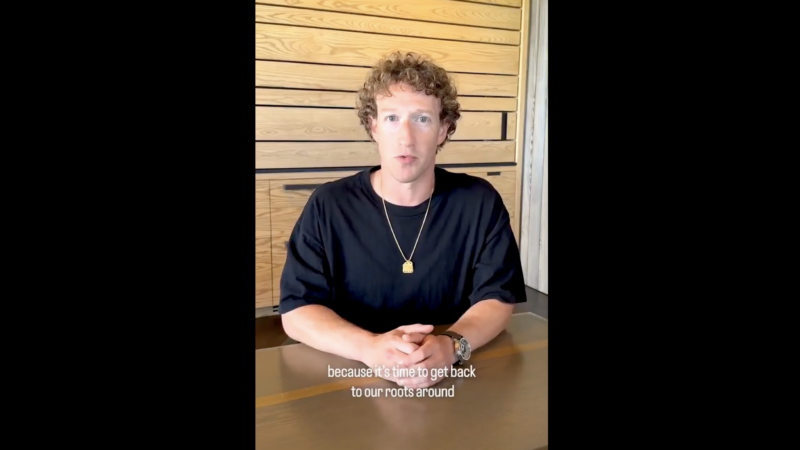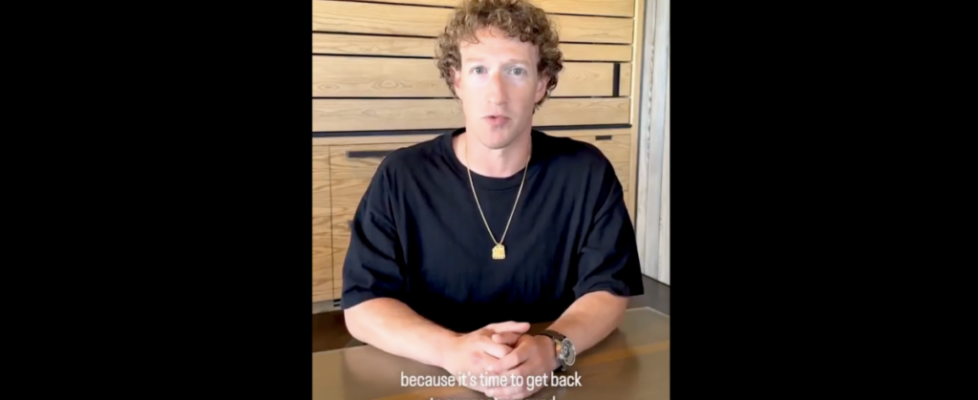Mark Zuckerberg Was Right To Fire Facebook’s Rogue Fact-Checkers

A new era is dawning at Meta. CEO Mark Zuckerberg announced on Tuesday that third-party fact-checking organizations would no longer have the power to suppress disfavored speech on Facebook—a major, positive step toward restoring free expression and robust debate on the platform.
In his video announcing the changes, Zuckerberg conceded that moderators working at his social media properties—Facebook and Instagram—felt pressured after Donald Trump’s 2016 win to address mainstream media concerns about the spread of alleged misinformation online. He now believes that their efforts to fix this supposed issue caused more problems than they solved.
“After Trump first got elected in 2016, the legacy media wrote nonstop about how misinformation was a threat to democracy,” said Zuckerberg. “We tried in good faith to address those concerns without becoming the arbiters of truth, but the fact-checkers have just been too politically biased and have destroyed more trust than they’ve created, especially in the US.”
Here is the full video from Mark Zuckerberg announcing the end of censorship and misinformation policies.
I highly recommend you watch all of it as tonally it is one of the biggest indications of “elections have consequences” I have ever seen pic.twitter.com/aYpkxrTqWe
— Saagar Enjeti (@esaagar) January 7, 2025
Zuckerberg also detailed plans to scrap the platforms’ de-prioritization of political topics and rein in automatic filters, a category of moderation that he says is prone to error.
“It means we’re going to catch less bad stuff, but we’ll also reduce the number of innocent people’s posts and accounts that we accidentally take down,” he said.
These changes are wildly positive. It’s also heartening that Zuckerberg seems to understand precisely what had gone wrong, and why: The company made attempts to satisfy both mainstream media institutions and even government agencies, particularly when it came to controversial political topics like COVID-19. What moderators soon discovered is that this is impossible; there is no end to the amount of speech suppression that is desired by censorship-inclined entities. Politicians in both parties dragged Zuckerberg before the U.S. Congress to answer for a vast array of alleged sins—the end of democracy, the abuse of children, tensions with Russia, and more.
What unites legacy media institutions with politically motivated speech hunters in government is growing frustration over their own loss of control with respect to guardrails of acceptable speech. Thanks to social media, these guardrails scarcely exist; by inveighing constantly against Facebook, the old guard hoped to re-install them. This was the theme of my 2021 book, Tech Panic: Why We Shouldn’t Fear Facebook and the Future, which attempted to shed light on how bad-faith arguments against the company were providing cover for greater censorship and regulation.
At the time, it was a somewhat controversial thesis; even the political right was interested in aggressively regulating Big Tech or breaking up the companies entirely. Four years later, thanks to exposes like Matt Taibbi’s Twitter Files and my own Facebook Files, the public is more aware of the role that explicit government pressure played in enacting the regime of censorship.
This does not mean that tech executives were blameless with respect to the moderation decisions that ensued, but it should mean that public ire is better directed at government bureaucrats who represented the Centers for Disease Control and Prevention (CDC), the FBI, the Department of Homeland Security, and the White House.
Needless to say, the third-party fact-checking organizations that will lose their clout as a result of Zuckerberg’s proposed changes are none too pleased. In a New York Times article about the news—with a characteristically snarky headline “Meta Says Fact-Checkers Were the Problem. Fact-Checkers Rule That False.”—the Poynter Institute, one of Facebook’s official fact-checking organs, protests that Meta and Meta alone had the power to take down content. This is technically true, but the fact-checkers knew exactly what the deal was; Facebook gave them official status as approved verifiers of information and explicitly stated that moderators would remove content consistent with the verifiers’ recommendations.
Said recommendations were frequently misguided. In December 2021, a fact-checker called Science Feedback flagged something I had written for Reason as “false information.” As a result, the article’s image was blurred and its distribution was presumably impacted. As Science Feedback later conceded, their fact-check was erroneous—my article was not. The decision was eventually reversed; TV host John Stossel had a similar experience.
It is reassuring to hear Zuckerberg acknowledge issues with this form of fact-checking; the CEO said he plans to launch a new system in line with X’s Community Notes, a crowd-sourced form of verification that allows all users to weigh-in, more closely mirroring the Wikipedia approach. Even The Times begrudgingly admits that “researchers have found the program can be effective when paired with other moderation strategies.”
In Zuckerberg’s video, he concluded by noting that the First Amendment’s protections for free speech have enabled the U.S. tech sector to thrive. Contrast that with much of the rest of the world.
“Europe has an ever-increasing number of laws, institutionalizing censorship, and making it difficult to build anything innovative there,” he said. “Latin American countries have secret courts that can order companies to quietly take things down. China has censored our apps from even working in the country. The only way that we can push back on this global trend is with the support of the US government, and that’s why it’s been so difficult over the past four years when even the US government has pushed for censorship.”
This is a key admission. The U.S. is a driver of tech innovation because its government protects free speech. Said protections are imperfect, but they are stronger here than anywhere else. They are worth maintaining, and even strengthening so that the U.S. can continue to be the most prosperous and technologically advanced country in the world.
The post Mark Zuckerberg Was Right To Fire Facebook’s Rogue Fact-Checkers appeared first on Reason.com.
